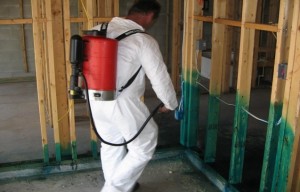Advanced Termite Control: Proven Approaches for Removing Termite Infestations
Advanced Termite Control: Proven Approaches for Removing Termite Infestations
Blog Article
Ecological Effect of Parasite Control: Harmonizing Performance With Sustainability
The environmental influence of parasite control is a crucial concern that needs a fragile equilibrium between attaining efficiency in taking care of parasites and guaranteeing sustainability of our ecological communities. From the usage of damaging chemicals that seep into our soil and water to the unplanned effects on non-target types, the effects of traditional bug control methods are far-reaching.
Hazardous Chemicals in Insect Control
The utilization of hazardous chemicals in pest control poses substantial ecological and wellness threats that require cautious factor to consider and reduction methods. Chemicals, insecticides, and herbicides are frequently made use of to get rid of insects, yet their prevalent application can lead to unplanned consequences. These chemicals can infect soil, water resources, and the air, impacting not only the targeted bugs however also useful insects, wildlife, and people.

To resolve these risks, integrated parasite administration (IPM) techniques are being advertised as an extra sustainable alternative. IPM includes a combination of methods such as biological control, habitat adjustment, and the targeted usage of pesticides as a last resort (ant control monroe nc). By embracing a holistic technique to pest control, we can lessen the environmental and health and wellness influences linked with hazardous chemicals while efficiently taking care of pest populations
Influence On Non-Target Types
Thinking about the unexpected consequences of insect control techniques, the influence on non-target species is a vital aspect that requires complete examination. While insect control measures aim to target certain insects, other organisms in the environment may be inadvertently affected. Non-target varieties, consisting of valuable bugs, birds, creatures, and also plants, can suffer indirect or straight damage from chemical applications or biological control techniques.
Chemicals can have deadly or sub-lethal effects on non-target varieties. As an example, pesticides designed to deal with a particular insect parasite might damage pollinators like or natural killers such as ladybugs. In addition, chemical deposits can accumulate in the setting, influencing non-target microorganisms gradually. Similarly, biological control agents, if not species-specific, can posture threats to unintended targets, disrupting the ecological balance.
To mitigate the influence on non-target types, integrated pest management (IPM) techniques that emphasize an all natural approach to pest control are advised. These approaches prioritize using environmentally pleasant methods, minimizing injury to valuable microorganisms while efficiently managing pest populations. Carrying out thorough threat evaluations and keeping track of the end results of insect control efforts are essential action in guarding non-target species and advertising overall community wellness.
Soil and Water Contamination
Unintentional ecological repercussions of parasite control approaches expand beyond affecting non-target types, with substantial ramifications for dirt and water contamination. Pesticides, herbicides, and chemical fertilizers made use of in insect control can leach into the soil and pollute groundwater, posing a danger to both aquatic and terrestrial environments. Soil contamination can interfere with the equilibrium of bacteria crucial for vitamins and mineral cycling and plant growth, bring about reduced soil fertility and efficiency. These chemicals can persist in the environment for extended durations, accumulating in the soil and possibly going into the food chain.
Water contamination is an additional crucial concern connected with parasite control practices. Runoff from farming areas treated with pesticides can bring these chemicals into neighboring water bodies, influencing marine microorganisms and water quality. Contaminants in water resources can have significant repercussions, impacting not only aquatic life but likewise human health through the usage of contaminated you can try these out water or marine microorganisms. To reduce dirt and water contamination from bug control activities, incorporated bug management techniques that focus on sustainability and decrease chemical inputs are vital.
Air Air Pollution From Pesticide Usage
Direct exposure to air-borne chemicals throughout farming applications positions a substantial concern for air pollution control measures. Additionally, chemical drift, where chemicals are lugged by the wind to unintended areas, can lead to the contamination of nearby communities and water bodies.

Approaches for Sustainable Insect Control
In the world of agricultural techniques, applying lasting pest control techniques is extremely important for maintaining eco-friendly equilibrium and safeguarding crop returns. Lasting pest control stresses using eco-friendly methods to take care of parasite populations efficiently while minimizing damage to non-target organisms and ecosystems. Integrated Pest Administration (IPM) is an extensively adopted strategy that incorporates organic, social, physical, and chemical control methods to attain long-lasting insect administration options.
Crop rotation and diversity are additionally efficient methods to interfere with pest life cycles and create less favorable conditions for insects to prosper. Eventually, by integrating these sustainable bug control techniques, farmers can achieve a balance in between pest administration performance and environmental stewardship.
Verdict
To conclude, the environmental impact of insect control methods must be meticulously thought about to balance effectiveness with sustainability. Harmful chemicals utilized in bug control can cause dirt and water contamination, air contamination, and harm non-target types - ant control. It is essential to apply lasting insect control strategies to minimize these negative effects on the setting and advertise a much healthier community for future generations
By adopting a holistic technique to pest control, we can reduce the environmental and wellness effects connected with unsafe chemicals while effectively handling pest populaces.

To mitigate the air contamination created by chemical use, it is vital to adopt integrated pest administration methods that prioritize the usage of non-chemical parasite control methods, such as plant turning, all-natural killers, and resistant crop selections. Lasting bug control stresses the use of eco friendly approaches to manage parasite populations properly while lessening injury to non-target microorganisms and communities. Integrated Bug Administration (IPM) is an extensively adopted method that incorporates organic, cultural, physical, and chemical control approaches to attain long-term parasite administration solutions.
Report this page